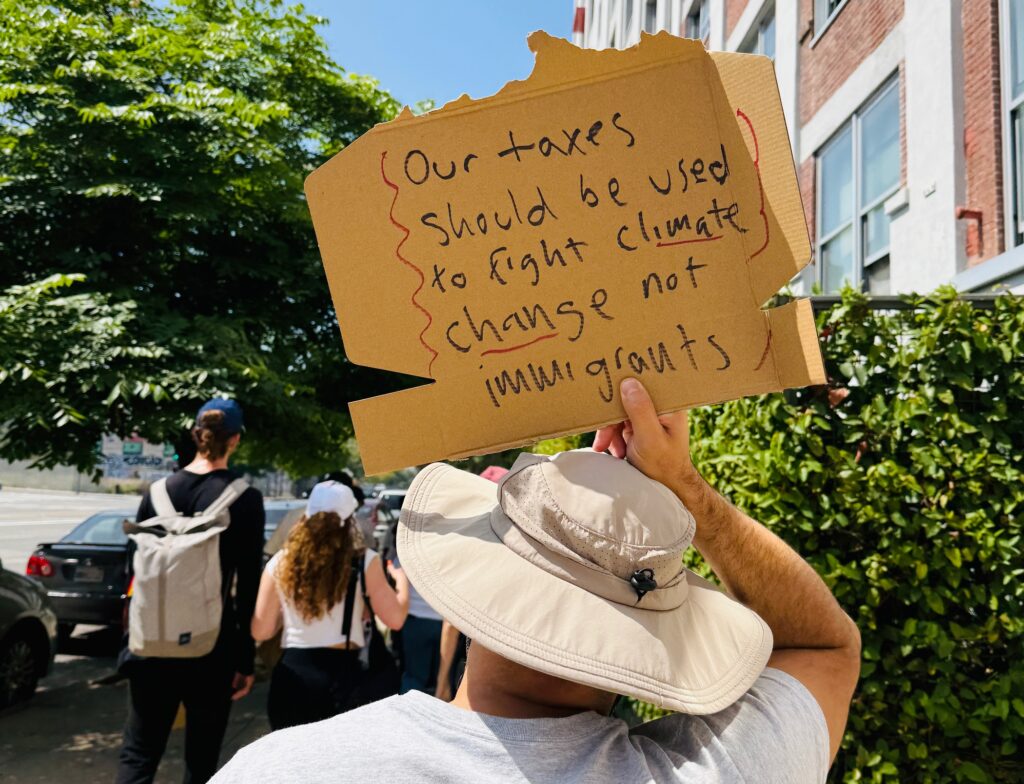Immigration Raids are an Attack on Climate
The Drain is a weekly roundup of environmental and climate news from Legal Planet.

It’s hard to watch the Trump administration test drive authoritarianism in California.
Since the inauguration, I’ve found solace in slowly rewatching The West Wing, a good bedtime story for anyone who feels nostalgia for partisan politics of yesteryear. Anyone else doing this?
It’s uncanny how my rewatching has lined up with real world events. In April when Sen. Cory Booker gave his 25-hour speech on the floor, I watched the episode in which a fictional Sen. Howard Stackhouse filibusters against a health care bill. As this White House has targeted funding for the public broadcasting, so did a fictional House member in an episode about defunding Sesame Street. Season 5 ends with a bombing of Gaza. Now in Season 6, I’m watching the Bartlet White House deal with a Republican Congress passing a budget bill just as real Republicans are trying to push through their big budget bomb.
But TV has its limits. Last week, three things happened that have no West Wing corollary because we are in uncharted waters.
Welcome to The Drain, a weekly roundup of environmental and climate news. Subscribe to the newsletter here.
I’m talking about the Trump administration wresting control of the California National Guard and needlessly deploying marines in LA. Then federal officers violently removed our Senior Senator Alex Padilla from a public press conference, handcuffing him moments after the DHS Secretary pledged to “liberate the city” from the elected governor and mayor. That same day, Trump signed a trio of congressional resolutions that improperly seek to vaporize California’s long-standing authority under the Clean Air Act to regulate vehicle pollution to clean our air. That last one got less coverage than it deserves.
“They said it couldn’t be done,” Trump said at the White House signing (before giving the podium to an oil executive). He’s right: The nonpartisan Senate parliamentarian and an independent government watchdog literally said it couldn’t be done, because Congress can’t use the Congressional Review Act (CRA) to revoke EPA waivers. Remarkably, Senate Republicans did it anyway, busting through another norm. California Attorney General Bonta immediately filed a lawsuit with the Attorneys General of 10 other states. The New York Times reported quickly on California’s response in terms of the lawsuit and executive order for CARB to go back to the drawing board. Politico’s California Climate newsletter had the angle of how California could soon be found out of attainment. CalMatters coverage did a good job of capturing the controversy over using the CRA to bust Senate norms. This overthrow of California authority is an attack on climate.
I’m realizing that watching The West Wing before bed will not save my mental health. There are only 155 episodes and 1,312 days of the administration left. But seeing popular resistance helps.
This weekend more than 5 million people participated in over 2,100 rallies and “No Kings” protests. In California that included big protests in DTLA, Pasadena, West Hollywood, Ventura, San Diego and Orange counties, Shasta County, Sacramento, the Bay Area, the Central Valley, the Inland Empire. Can this resistance be tapped to stop the budget bill?

I saw a handful of environmental protest signs, but the climate crisis was hardly front and center in these “No Kings” protests. Understandably, most demonstrators were focused on ICE raids and authoritarianism. And yet, environmental justice is a subplot here.
For one thing, climate change is driving migration. Industries driving the climate crisis are making the Global South less livable. “The climate justice movement and the migrant justice movement have a common oppressor,” writes Isaias Hernandez at Dear Environmentalist.
For another thing, a federal budget that prioritizes immigration raids and tax cuts steals from environmental enforcement, clean energy incentives, and disaster relief. I rode the metro downtown next to a man in an “Altadena” hat and cap. He clearly wanted to represent survivors of the Eaton Fire. He’s not alone. A huge majority of registered voters, including moderate Republicans, oppose the slashing of climate programs. Nearly 80% of registered voters oppose ordering federal agencies to stop doing research on global warming, according to brand new survey data from the Yale Program on Climate Change Communication. These unpopular attacks on climate are authoritarian.
And there are lessons from previous environmental protests relevant to the current political moment, as others have noted. The story of the Dakota Access pipeline protests at Standing Rock, and how Energy Transfer Partners ended up defeating Greenpeace in court, is one such parallel. It’s the topic of Season 12 of the Drilled Podcast by Alleen Brown. Here in Los Angeles, recent demonstrations against ICE have been largely peaceful and nothing like past face-offs with law enforcement, though you wouldn’t know it from the burning Waymos that some national media are playing on a loop. The Standing Rock protests are a good example of scattered violence being used to smear a larger movement, Emily Atkin writes at HEATED.
In LA, when immigrant community members are under attack, so are environmental movement leaders. “These are our members demanding clean air standards,” wrote Kim Orbe, Sierra Club Angeles’ Acting Chapter Director in an email newsletter. “This is our community with whom we have the privilege to work alongside to end neighborhood oil drilling. This is our community ensuring equitable access to open space and public lands for you to enjoy,” Orbe writes. ICE raids are an attack on Angelenos working for a healthy environment.
Here’s what else is making news…
Trump Rollbacks

EPA Administrator Lee Zeldin last Wednesday proposed to repeal all “greenhouse gas” emissions standards for power plants under Section 111 of the Clean Air Act. The Clean Air Task Force legal director told Reuters that the proposals “are bad for public health and bad for climate, all to prop up some of the highest polluting power plants in the nation.” EPA’s logic rests on the definition of “significant” as in emissions that “contribute significantly to dangerous air pollution.” Rather than a purely quantitative measure, EPA will use “the Administrator’s informed judgement” to determine this. And the Administrator is going to decide that if there is no “cost-effective” way to reduce emissions, then those emissions can’t be a significant problem. That all make sense? Not to me either. Now comes a public comment period and virtual public hearing on the changes.
A team of AP journalists put together a comprehensive look at how ending these and other rules would have devastating consequences to human health. If the regulations are eliminated, “the country could see up to 30,000 premature deaths and $275 billion in additional costs annually, largely due to hospitalizations and health impacts tied to pollution,” AP reports.
A coalition of advocacy groups including NRDC and Sierra Club sued to overturn Trump’s decision to give almost 70 coal-fired power plants a two-year exemption on compliance with EPA regulations on mercury and other pollutants.
Many influential climate thinkers in the Obama and Biden administrations talked with Politico about why major climate rules have failed to stick and survive Trump 2.0. Harvard’s Jody Freeman said, “we’ve lost the culture war on climate, and we have to figure out a way for it to not be a niche leftist movement.”
Good news
A big win: Yurok Nation has reclaimed the vital Blue Creek and watershed area to restore major salmon run and forest land in what’s been described as the largest landback deal in California history. It was a complicated financial deal involving California carbon credits, as Justin Catanoso reports for Mongabay.
Drill, Baby, Drill: Fervo Energy, the geothermal developer, reported that it was able to drill its deepest and hottest geothermal well to date in just 16 days. The next day, the company announced an additional $206 million in financing for its Cape Station project in Utah, Heatmap News reports.
A first: Earlier this month, a U.S. company landed an all-electric aircraft carrying passengers at New York’s John F. Kennedy Airport. According to the company, Beta Technologies, the flight from the airport in East Hampton took 45 minutes and cost just $8 to power, General Aviation News reports.
A new record: The number of electric vehicle chargers continues to increase. There are about 55,200 fast chargers in the United States as of May, up from 42,200 a year earlier, according to federal data.
Bad news
The EPA has told staff to stop enforcing violations against fossil fuel companies, CNN reports citing multiple sources. An EPA spokesperson disputed the account.
Climate.gov, a major website of NOAA that supports climate education, will no longer publish new content, former staffers told Eric Holthaus for the Guardian.
Wildfires across Canada are devouring land at a pace unseen in any year other than the historic 2023 season.
The U.S. Chemical Safety and Hazard Investigation Board, a little-known government agency that investigates chemical explosions, will likely shut down before completing its open probes, Grist reports.
The Big Budget Bomb

Senate Republicans will likely debate their big budget bomb on the floor next week, but last night the Senate Finance committee released text of the legislation. The proposal would leave some Biden-era clean energy tax credits (geothermal, hydropower, batteries) in place longer than the sweeping approach of the House version. But it would cover the added cost with deeper cuts to Medicaid. And the senate version still mostly nixes solar, wind, and EV carve outs, Heatmap News reports.
Trump’s EPA announcements on power plant pollution rollbacks inadvertently made the case for voting against the big budget bill, Grist’s Naveena Sadasivam writes, because the bill would hinder the stated goal of encouraging as many energy sources as possible are needed to power America’s future.
Energy Innovation has created individual state fact sheets for how the mega bill would impact all 50 states.
The House version of the bill threatens as many as 300,000 clean energy-related jobs, as well as many more indirect jobs that could stem from growing incomes and rising populations, says a new report from BlueGreen Alliance.
The House version as passed would “increase annual energy bills by $5.2 billion across California households annually in 2030, swelling to more than $10 billion in higher energy costs by 2035, for a total of $47 billion during the budget window of 2025 to 2034,” according to an analysis by Energy Innovation. It would cost California’s workforce 70,100 jobs in 2030 and more than 110,300 jobs in 2035 as new investment in domestic energy and manufacturing falters while shrinking annual GDP in California by $14 billion in 2030 and $25 billion in 2035.
Dem Sen. Martin Heinrich, from New Mexico joined David Roberts for a Canary Media live event in Washington, D.C. to discuss the fate of the Inflation Reduction Act clean energy incentives within the mega bill and the jockeying behind the scenes.
California

Erin Stone at LAist reports on pollution from aggregate facilities and a state bill that seeks to address it. Two UCLA Law students Maya Hernandez and Ian Bertrando who worked on the bill and testified on its behalf spoke with LAist are quoted.
More than 30 million Californians across the state could see their electric bills go up to pay for the devastating Eaton fire, Melody Peterson reports for the LA Times. That’s because if SoCal Edison equipment is found to have sparked the fire, as lawsuits allege, the damage claims could exhaust the state’s $21-billion wildfire fund.
The California Energy Commission last Wednesday approved a 9,500-acre solar and battery project in Fresno County that Politico says is the largest in the country and a victory for speed. “The vote marks the first time California is using a streamlined permit process set up by a 2022 state law meant to shorten timelines and circumvent local opposition.”
Democrats last week elected Sen. Monique Limón as the next leader of the California Senate, the first woman of color to hold the position. Limón from Santa Barbara, is known for efforts to regulate the oil industry. She authored a 2022 law that requires setbacks around new oil and gas wells and steps to protect residents at old wells, and pushed for an unsuccessful 2021 bill to ban oil fracking, as Jeanne Kuang writes at CalMatters.
Politico profiles California’s MAGA prosecutor, Bill Essayli, the recently appointed 39-year-old U.S. attorney for California’s central district.
After years of firm denials, Gov. Newsom is finally acknowledging his presidential ambitions, saying “it’s a path I could see unfold.”
Jack Dolan reports for LAT what it feels like to suddenly be inside a prescribed burn with CalFire.
Los Angeles

The Trump administration’s invasion of LA and travel ban is actively hurting the World Cup and all of LA’s future mega-events, writes Alissa Walker at Torched. “To demonize a host city until parents are so terrified of being disappeared by the administration that the second-largest school district in the country has to set up anti-ICE safety perimeters around its campuses for the last day of school?” In related news, a World Cup boat party attended by FIFA officials was canceled after an ICE agent and the Coast Guard boarded the boat to do an inspection.
Last week, the LA City Council took baby steps toward eliminating requirements for off-street parking for new development. The motion by Councilmembers Bob Blumenfield, Nithya Raman, and Katy Yaroslavsky directs city departments to report on the feasibility of citywide elimination of off-street parking requirements for new development, as Joe Linton writes for StreetsblogLA.
Metro successfully opened the LAX/Metro Transit Center Station (LAX/MTC) on June 6, “adding a long-awaited connection that Southern Californians have been wanting for decades” and that has taken many years to achieve, writes India Mandelkern for The Source.
Food & Climate
Grocery shopping is one of the most impactful climate decisions we make when it comes to individual actions. My former KCRW colleague Caleigh Wells has a story at the Associated Press on climate meal planning that goes beyond meat vs. tofu, her first story on the climate choices beat for AP.
At this ahimsa dairy farm, it’s not just their refusal to slaughter their cattle that sets them apart. They don’t breed their cows to stimulate milk production, Grace Hussain reports for Sentient. “The cow is given a life that they otherwise wouldn’t have.” But the milk costs $18 a gallon.
A new study by researchers at UC Riverside purports to show the effectiveness of dairy digesters, manure ponds tightly sealed to capture and re-use the methane they produce. The study, published in Global Change Biology Bioenergy, says these systems can reduce atmospheric methane emissions by roughly 80%. California state officials have used estimates about this in their climate planning.
Energy

Dan Gearino tells a compelling story at Inside Climate News about growing calls to rein in investor-owned utilities’ profits through the tale of a former wrestler and Sempra employee who became disillusioned because of a growing realization that the utility industry’s business model had drifted away from a spirit of public service.
The California Supreme Court heard arguments last week on the California Public Utilities Commission’s actions to slash financial incentives for residential rooftop solar panels in 2022.
The U.S. Army Corps of Engineers and the Fish and Wildlife Service continue to refuse to process permit applications for onshore wind energy facilities nearly six months into the Trump administration, Jael Holzman first reported at Heatmap News, putting billions in energy infrastructure investments at risk.
Is it feasible for solar power to meet most of our electricity demand? Brian Potter at Construction Physics writes about doing simulations of solar power to understand “how much electricity demand solar PV can supply under different conditions,” and found that the falling costs of solar PV will make it feasible for solar to supply large fractions of electricity demand cost-effectively, even 70-80%.
Other stories worth your time
The climate community is remembering Minnesota Speaker Melissa Hortman, who was killed in an apparent political asassination. “Climate change is one of the greatest threats to Minnesota’s future, and we have a responsibility to be part of the solution,” she’s quoted as saying, remembered by Amy Holm at the Climate Registry. Hortman joined the US subnational delegation organized by The Climate Registry, Climate Action Reserve, and Georgetown Climate Center to attend COP 23 in Bonn in 2017.
Tonga could become the first country in the world to recognize that whales have inherent rights. The Pacific Island nation called for the recognition of whales as legal persons at United Nations Ocean Conference in Nice, France. It could mean appointing human guardians to represent them in court, Inside Climate News reports.
A new generation of storm forecasters go live to massive audiences on YouTube for hours during severe weather events, “offering real-time updates to millions of subscribers through a network of storm chasers, and even using AI,” Hillary Beaumont reports for Wired. But you won’t hear them talk about climate change so they’re hardly a replacement for forecasts and climate research being cut by Trump.
Climate havens are a fantasy and changing weather patterns and aging infrastructure mean nowhere is safe, argue Julie Arbit, Brad Bottoms and Earl Lewis in an essay for Zocalo Public Square.







Reader Comments